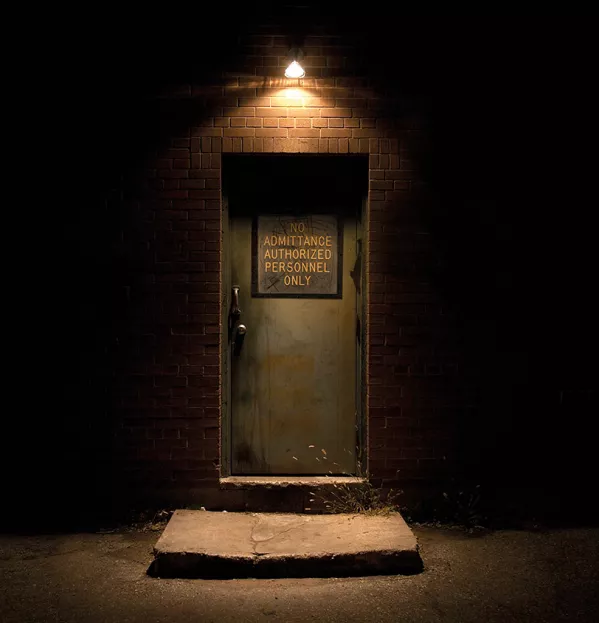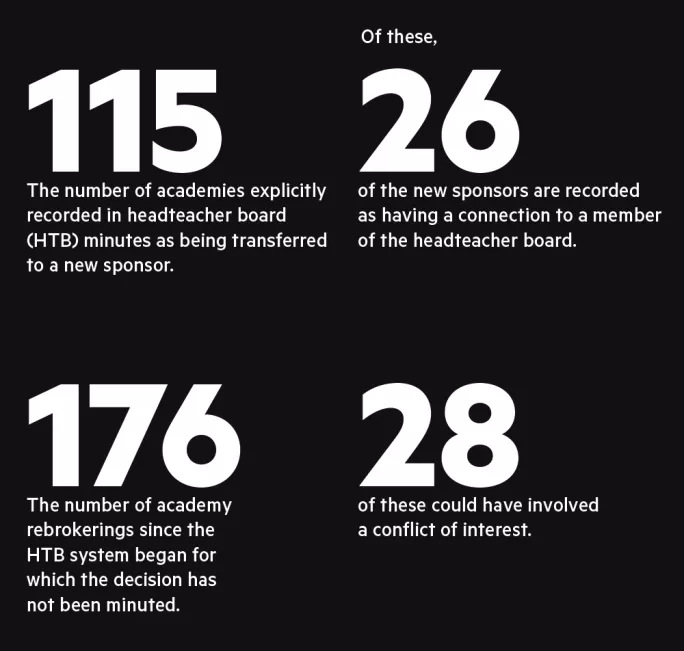Academy moves marred by ‘conflicts of interest’

They meet in private and have power over the futures of thousands of state-funded schools.
But now concerns are being raised that not enough is being done to prevent conflicts of interest within England’s eight regional headteacher boards (HTB) or to ensure that their decisions are open and transparent.
A TES investigation has established that in more than a fifth of the cases (26 out of 115) where the boards are recorded as having “rebrokered” control over an academy, the school has been handed over to a trust that a member of the board making the decision has an interest in.
A further 28 of the academy handovers carried out since the HTBs began work in September 2014 could also have involved conflicts of interest - as the academies in question ended up with a trust connected to a local board member. But TES cannot confirm whether this is the case for the latter group as there are no published records of who took the rebrokering decisions and when.
Angela Rayner, Labour shadow education secretary, called for education secretary Justine Greening to “intervene immediately and demand an explanation about why there is no public record of these rebrokering arrangements or whether there was any conflict of interest”.
In all 26 recorded decisions with conflicts of interest, the HTB minutes list the relevant board members as either not being at the meeting or leaving the room during the discussion.
But there have been warnings that this practice may not be enough to prevent a board member from influencing a crucial decision about the future of an academy, even if they are not physically present.
In September 2015, the National Governors’ Association told the Commons Education Select Committee that “simply excluding the individual from the discussion and the formal decision-making process does not mean they do not unconsciously or consciously affect the decision”.
‘Underlying influence’
It added: “Their underlying influence as a member of the HTB will still be felt and it is difficult to argue that the other board members’ consideration was not affected by their knowledge of the excluded individual.”
The TES investigation, using a Freedom of Information request and an analysis of HTB minutes and the register of interests, looked at all 291 rebrokerings since September 2014.
There is no evidence that any of the individuals concerned have behaved improperly. But critics say the findings show the system is open to abuse.
We need more transparency and clarity about what is going on
Mary Bousted, general secretary of the ATL teaching union, said the problems were rooted in the government’s decision that the core of England’s eight regional HTBs should be made up of successful local headteachers.
“It is not surprising there are conflicts of interest,” she said. “They are almost inevitable if you have the system we have at the moment.
“The fact you can’t track through the minutes key decisions of a school being rebrokered just demonstrates the inadequacy of the accountability of the boards.”

All headteacher boards, apart from the one covering the East of England and North-East London, supported transferring at least one academy to an organisation connected to one of its board members.
The 28 unrecorded rebrokering decisions with potential conflicts of interest are among a total of 176 academy handovers - since September 2014 - where there is no published record of the decision.
There is a chance that some of these decisions could have been taken by the Department for Education before the HTBs were set up, with the handover carried out afterwards.
But 141 of the 176 were rebrokered at least a term after the HTBs began their work. The DfE did not offer any clarification.
Malcolm Trobe, interim general secretary of the Association of School and College Leaders, said that the lack of minuted information about some rebrokerings was “something that needs looking at”.
He called for more openness about the workings of the headteacher boards. There was “a tension” between the need to recruit successful local educationalists who can give RSCs advice and expertise, and ensuring potential conflicts of interest were managed, he said.
“We need more transparency and clarity on what’s going on because things need to be reported accurately,” Mr Trobe said.
“It’s in the interests of the members of the HTB to show how it is done, as it protects them from any allegation of self-interest.”
Matthew Wolton, a partner specialising in academies at law firm Knights, said that while the issue was worth looking at, conflicts of interest were almost inevitable.
“The only way to avoid it happening is to have no one who could have a conflict of interest, in which case they would not be appropriate for the job,” he said. “[The solution] is about being transparent.”
A Department for Education spokesperson said: “Our published advice is clear: HTB members must remove themselves from discussions and must not provide advice on cases where there is a conflict of interest, a potential conflict of interest or an appearance of such a conflict.’
You need a Tes subscription to read this article
Subscribe now to read this article and get other subscriber-only content:
- Unlimited access to all Tes magazine content
- Exclusive subscriber-only stories
- Award-winning email newsletters
Already a subscriber? Log in
You need a subscription to read this article
Subscribe now to read this article and get other subscriber-only content, including:
- Unlimited access to all Tes magazine content
- Exclusive subscriber-only stories
- Award-winning email newsletters